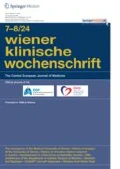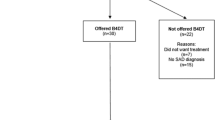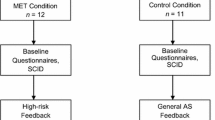Summary
Whether the primary motivation for entering therapy significantly influences the results of inpatient psychotherapeutic treatment is subject to debate. The purpose of this study was to examine this question in women with generalized anxiety disorder. The monitored results from 54 female inpatients (29 who were highly motivated to enter therapy and 25 who were minimally motivated) were compared. The questionnaire for measuring psychotherapy motivation (FMP), the symptom checklist (SCL-90-R) and the questionnaire for measuring change of experience and behavior (VEV) were used to assess motivation and results of treatment. The patients were tested at admission and after the fourth and sixth weeks of therapy, at which time the patients with high primary motivation showed a significantly more marked reduction of anxiety symptoms (SCL-90-R, P < 0.01). These patients also had better test results on the VEV (P < 0.01). However, both quantitative and qualitative improvements in motivation for therapy were observed among the less motivated patients, and this improvement did not differ from that of the highly motivated group on most scales of the FMP (P < 0.05 to P = 0.43). Highly motivated patients with generalized anxiety disorder can profit significantly more from inpatient psychosomatic treatment than those who have less primary motivation. However, less motivated patients can show significant positive changes in developing motivation for therapy, as well as in the final results of treatment. Establishing and developing motivation prior to hospitalization might contribute to more efficient and cost-effective clinical treatment.
Zusammenfassung
Es wird diskutiert, ob Behandlungsergebnisse in der stationären Psychotherapie bedeutsam durch die primäre Therapiemotivation beeinflusst werden. Ziel dieser Studie war, diese Fragestellungen am Beispiel von Frauen mit generalisierter Angststörung zu überprüfen. Wir haben Behandlungsergebnisse von 54 stationären Patientinnen ausgewertet: 29 waren vor der Behandlung hoch therapiemotiviert, 25 zeigten eine niedrige primäre Behandlungsmotivation. Als Messinstrumente wurden Fragebogen zur Therapiemotivation (FMP), Symptom-Checkliste (SCL-90-R) und Veränderungsfragebogen des Erlebens und Verhaltens (VEV) benutzt. Die Patientinnen wurden bei Aufnahme und nach der vierten und sechsten Behandlungswoche untersucht. Am Ende der Beobachtungszeit zeigten Patienten mit primär hoher Behandlungsmotivation eine signifikant stärkere Reduktion der Angstsymptomatik (SCL-90-R, P < 0,01) und signifikant höhere Bewertung im VEV (P < 0,01). Jedoch wurde nach der sechsten Behandlungswoche auch bei Patientinnen mit einer primär niedrigeren Motivation eine sowohl quantitative als auch qualitative Steigerung der Therapiemotivation beobachtet; die Motivationslage war zwischen den beiden Gruppen nicht mehr signifikant different (die meisten FMP-Skalen: P < 0,05 bis P = 0,43). Patientinnen mit einer anfänglich hohen Therapiemotivation profitierten von der Therapie signifikant mehr. Jedoch auch die primär wenig motivierten Patientinnen zeigten sowohl eine signifikante Steigerung der Therapiemotivation als auch Besserung der Krankheitssymptome. Eine gezielte Förderung der Therapiemotivation vor stationärer Aufnahme könnte möglicherweise zu einer noch ergebnis- und kosteneffektiveren Behandlung beitragen.
Similar content being viewed by others
Author information
Authors and Affiliations
Corresponding author
Rights and permissions
About this article
Cite this article
Nickel, C., Tritt, K., Kettler, C. et al. Motivation for therapy and the results of inpatient treatment of patients with a generalized anxiety disorder: A prospective study. Wien Klin Wochenschr 117, 359–363 (2005). https://doi.org/10.1007/s00508-005-0334-y
Received:
Accepted:
Published:
Issue Date:
DOI: https://doi.org/10.1007/s00508-005-0334-y




